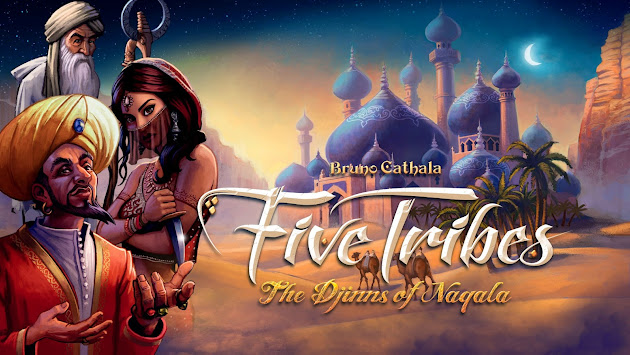
There were a lot of great games released at Gen Con this year. Five Tribes, from Days of Wonder and Bruno Cathala, was one of the most talked about - and hardest to get.
Now that the game has finally hit distribution, does it live up to all that hype?
| No "board" but still takes up a lot of space! Looks good doing it, though. |
Five Tribes is a part logistics puzzle, part action selection, part point salad game that pits players against one another, each of them trying to best maneuver the five tribes of the "Land of 1001 Nights" in order to become the next Sultan!
The game board is made up of 30 individual tiles, which are arranged randomly before each game. Meeples of 5 different colors are placed on these tiles, also randomly. Players will take turns picking up a group of meeples from any tile on the board, and dropping one off at a time, mancala-style, until they drop the last meeple they picked up. One important rule when choosing which tile to end up at - there must already be a meeple on the tile the player ends with that matches the color of the meeple she is placing on the tile.
| Days of Wonder has included some large, but superb player aids. |
Once the player finishes distributing the group of meeples she picked up, she performs two actions. First, she picks up all of the meeples on the tile she ended on that match the color of the meeple she placed there (always at least two because of the rule I mentioned above), and executes that tribe's action. If the player was able to pick up all of the meeples on a tile (because they were all the same color of the meeple she placed there) she gets to place one of her camels on the tile, and will score that tile's depicted points at the end of the game. Then, she also gets to perform the action of the tile she ended on.
| The leftmost tile allows a player to buy 2 goods cards for 6 gold. |
Gameplay continues until either one player places all of her camels or there are no legal moves left (no groups of meeples can be distributed in such a way that the final meeple to be placed will be the same color as one already on the destination tile).
The main mechanism of Five Tribes, the manacala-esque distribution of meeples is so much fun and super satisfying. Players are challenged each turn to both get as many points as they can (hopefully more than they bid for their turn order) as well as keep from setting the other players up to either take ownership or a tile or otherwise have a huge turn.
Five Tribes absolutely lives up to the hype that surrounded it during Gen Con. The game is a solid 9.0 in my book - one of my favorite releases this year.


0 komentar:
Posting Komentar